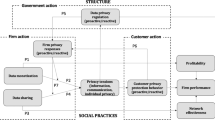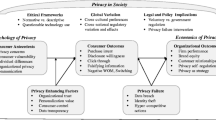Abstract
Three of the major issues in information ethics – intellectual property, speech regulation, and privacy – concern the morality of restricting people’s access to certain information. Consequently, policies in these areas have a significant impact on the amount and types of knowledge that people acquire. As a result, epistemic considerations are critical to the ethics of information policy decisions (cf. Mill, 1978 [1859]). The fact that information ethics is a part of the philosophy of information highlights this important connection with epistemology. In this paper, I illustrate how a value-theoretic approach to epistemology can help to clarify these major issues in information ethics. However, I also identify several open questions about epistemic values that need to be answered before we will be able to evaluate the epistemic consequences of many information policies.
Similar content being viewed by others
References
Benn, S.I. (1984), ‘Privacy, Freedom and Respect for Persons’, in F.D. Schoeman, ed., Philosophical Dimensions of Privacy, Cambridge: Cambridge University Press, pp. 223–244.
Broome, J. (1991), Weighting Goods, Cambridge: Basil Blackwell.
Broome, J. (1994), ‘Discounting the Future’, Philosophy and Public Affairs 23, pp. 128–156.
Descartes, R. (1988), Selected Philosophical Writings, New York: Cambridge.
DePaul, M.R. (2001), ‘Value Monism in Epistemology’, in M. Steup, ed., Knowledge, Truth, and Duty, Oxford: Oxford University Press, pp. 170–183.
Driver, J. (1999), ‘Modesty and Ignorance’, Ethics 109, pp. 827–834.
Fallis, D. (2002), ‘Introduction: Social Epistemology and Information Science’, Social Epistemology 16, pp. 1–4.
Faltings, G. (1995), ‘The Proof of Fermat's Last Theorem by R. Taylor and A.Wiles’, Notices of the American Mathematical Society 42, pp. 743–746.
Field, H. (1982), ‘Realism and Relativism’, Journal of Philosophy 79, pp. 553–567.
Floridi, L. (2002), ‘What Is the Philosophy of Information?’, Metaphilosophy 33, pp. 123–145.
Floridi, L. (forthcoming), ‘Open Problems in the Philosophy of Information’, Metaphilosophy.
Floridi, L. and Sanders, J.W. (2002), ‘Mapping the Foundationalist Debate in Computer Ethics’, Ethics and Information Technology 4, pp. 1–9.
Frické, M., Mathiesen, K. and Fallis, D. (2002), ‘The Ethical Presuppositions Behind the Library Bill of Rights’, Library Quarterly 70, pp. 468–491.
Garoogian, R. (1991), ‘Librarian/Patron Confidentiality: An Ethical Challenge’, Library Trends 40, pp. 216–233
Goldman, A.I. (1999), Knowledge in a Social World, New York; Oxford.
Goldman, A.I. (2000), ‘Replies to Reviews of Knowledge in a Social World’, Social Epistemology 14, pp. 317–333.
Hardwig, J. (1985), ‘Epistemic Dependence’, Journal of Philosophy 82, pp. 335–349.
Harsanyi, J.C. (1977), Rational Behaviour and Bargaining Equilibrium in Games and Social Situations, Cambridge: Cambridge University Press.
Hettinger, E.C. (1989), ‘Justifying Intellectual Property’, Philosophy and Public Affairs 18, pp. 31–52.
Hoffmann, G.M. (2001), Copyright in Cyberspace, New York: Neal-Schuman.
Hume, D. (1977), An Enquiry Concerning Human Understanding, Indianapolis: Hackett.
Hutchins, E. (1995), Cognition in the Wild, Cambridge: MIT Press.
James, W. (1979), The Will to Believe and Other Essays in Popular Philosophy, Cambridge, MA: Harvard University Press.
Kawall, J. (2002), ‘Other-Regarding Epistemic Virtues’, Ratio 15, pp. 257–275.
Kirkwood, C.W. (1997), Strategic Decision Making, Belmont, CA: Duxbury.
Kitcher, P. (2001), ‘Knowledge and Tradition’, Philosophy Topics 29, pp. 251–270.
Lehrer, K. (1975), ‘Reason and Consistency’, in K. Lehrer, ed., Analysis and Metaphysics, Dordrecht: Reidel, pp. 57–74.
Levi, I. (1962), ‘On the Serious of Mistakes’, Philosophy of Science 29, pp. 47–65.
Maher, P. (1993), Betting on Theories, New York: Cambridge.
McDowell, A. (2002), ‘Trust and Information: The Role of Trust in the Social Epistemology of Information Science’, Social Epistemology 16, pp. 51–63.
Mill, J.S. (1978), On Liberty, Indianapolis: Hackett.
Moor, J.H. (1985), ‘What Is Computer Ethics?’, Metaphilosophy 16, pp. 266–275.
Paterson, R.W.K. (1979), ‘Towards and Axiology of Knowledge’, Journal of Philosophy of Education 13, pp. 91–100.
Plato (1961), Plato: The Collected Dialogues, Princeton: Princeton University Press.
Popper, K. (1972), Objective Knowledge, Oxford: Oxford University Press.
Rawls, J. (1971), A Theory of Justice, Cambridge, MA: Harvard University Press.
Riggs, W.D. (2002), ‘Reliability and the Value of Knowledge’, Philosophy and Phenomenological Research 63, pp. 79–96.
Riggs, W.D. (2003), ‘Balancing Our Epistemic Ends’, Nous 37, pp. 342–352.
Roger, T.J. (2003), Anarchist's Cookbook, http://isuisse.ifrance.com/emmaf/indanarcook.html.
Ross, W.D. (1930), The Right and the Good, Oxford: Oxford University Press.
Sidgwick, H. (1874), The Methods of Ethics, Chicago: University of Chicago.
Spinello, R.A. (1995), Ethical Aspects of Information Technology, Upper Saddle River, NJ: Prentice Hall.
Tavani, H.T. and Grodzinsky, F.S. (2002), ‘Cyberstalking, Personal Privacy, and Moral Responsibility’, Ethics and Information Technology 4, pp. 123–132.
Zagzebski, L. (2003), ‘The Search for the Source of Epistemic Good’, Metaphilosophy 34, pp. 12–28.
Author information
Authors and Affiliations
Rights and permissions
About this article
Cite this article
Fallis, D. Epistemic Value Theory and Information Ethics. Minds and Machines 14, 101–117 (2004). https://doi.org/10.1023/B:MIND.0000005138.57370.df
Issue Date:
DOI: https://doi.org/10.1023/B:MIND.0000005138.57370.df




